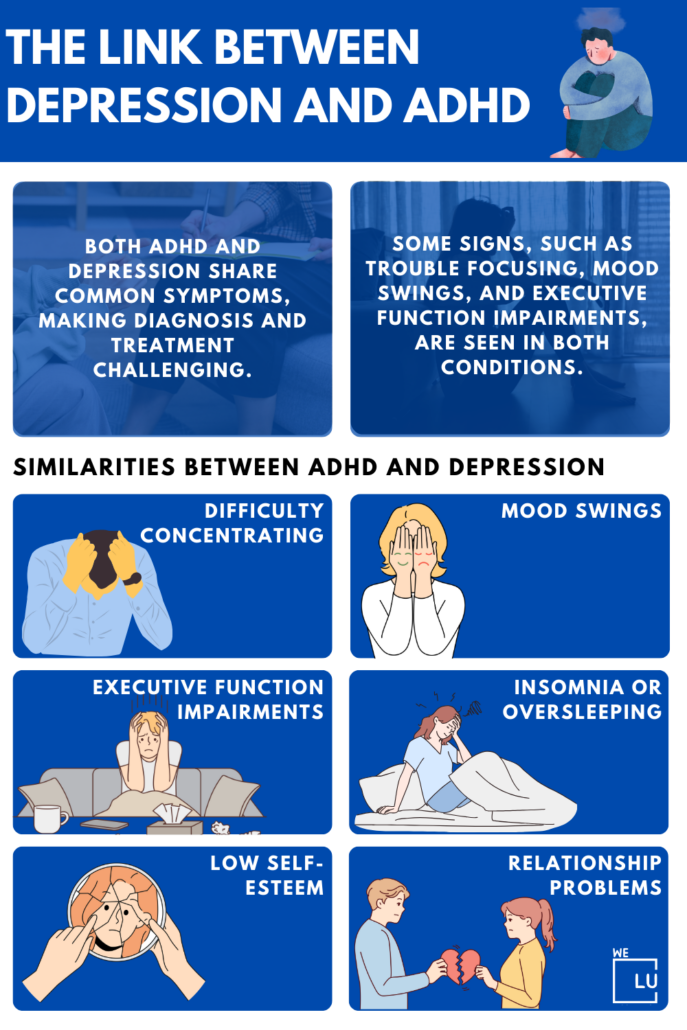Tips and Strategies to Cope with Depression and ADHD
✅ Structured Routine: Establish a daily schedule that includes specific times for work, relaxation, exercise, and sleep. Consistency in your routine can help manage ADHD symptoms while providing a sense of stability, which can be beneficial for depression.
✅ Mindfulness and Meditation: Practice mindfulness techniques to improve your ability to stay present and reduce racing thoughts. Mindfulness can be particularly effective in managing both ADHD and depression.
✅ Therapy and Support: Seek professional treatment, such as cognitive-behavioral therapy (CBT), to address negative thought patterns associated with depression and enhance executive functioning skills for ADHD.
✅ Medication Management: Consult with a healthcare provider about medication options. Some individuals may benefit from a combination of ADHD and depression medications to address both conditions effectively.

ADHD and Depression in Adults
The National Institutes of Health (NIH) did a study in 2021 that looked at the link between ADHD and women who are depressed regularly. A lot of these women showed signs of ADHD, and some of them met the official diagnostic standards for ADHD, according to the study. Interestingly, none of the people who showed symptoms of ADHD had a precise clinical diagnosis. This might have been missed because ADHD is often overlooked in clinical tests for adults.
The study also found that people with severe ADHD signs were more likely to be given antidepressants that were not the first choice. This shows that the people who worked with these people knew they had a more complicated and complex type of depression.
People with ADHD signs also tend to become depressed at younger, have more frequent episodes, have subthreshold depression symptoms that don’t go away, are more irritable, and have a higher risk of hurting themselves, committing suicide, or going to the hospital. This study shows how important it is to think about the possibility that women with early-onset, recurrent depression may have ADHD that hasn’t been identified yet. If you treat both ADHD and sadness at the same time, the results of your treatment might be better.
The study shows that ADHD and depression are two different diseases. Still, they can happen together and change how depression shows up, especially in women who have early-onset, recurring depression. According to this study, there may be a special kind of sadness that is linked to ADHD symptoms. This type of depression starts earlier, is worse, happens more often, and makes people more irritable.
These results emphasize how important it is to recognize and treat ADHD in people who have recurring depression for the best treatment outcomes. There should be more research done in the future to see if different treatment methods, like focusing on both sadness and ADHD symptoms, might work better for this group.

End the Emotional Pain. Get Your Life Back.
Feeling Depressed, Anxious or Struggling with Mental Health Illness? Get Safe Comfortable Mental Health Dual Diagnosis High-Quality Therapy From Counselors That Care. Begin Your Recovery Now.
Hotline (855) 940-6125Can ADHD Cause Depression and Anxiety?
People who have ADHD (Attention-Deficit/Hyperactivity Disorder) may be more likely to become depressed and anxious. ADHD is a neurodevelopmental disorder with signs like not paying attention, acting on impulses, and being too active. It can have a big effect on a person’s emotional health. These are some ways that ADHD can be linked to worry and depression:
- Chronic Stress: Dealing with the problems that come with ADHD, like having trouble focusing, staying organized, and finishing chores, can be frustrating and stressful. Stress that lasts for a long time can make you sad and anxious over time.
- Lack of Self-Esteem: People with ADHD often get lousy feedback or criticism, which can hurt their self-esteem. This can make you feel bad about your own body and add to your depression and worry.
- Problems in School and the Workplace: ADHD can make it hard to do well at school and work. Setbacks and frustration in these areas can make you feel like you’re not good enough, which can cause anxiety and sadness.
- Social Problems: ADHD can also make it hard to get along with other people. People with ADHD may have trouble controlling their impulses, which can make it hard to be around other people and cause them to feel alone. Problems like these can make people feel anxious and depressed.
- Impairments in the Executive Functions: People with ADHD often have problems with the parts of their brain that help them plan, organize, and control their emotions. These problems can make it harder for someone to handle stress and mental issues, which could lead to depression and anxiety.
First-class Facilities & Amenities
World-class High-Quality Mental Health Services & Behavioral Health Substance Abuse Treatment
Rehab Centers TourRenowned Mental Health Centers. Serene Private Facilities. Inpatient Rehab Programs Vary.
Mental Health Helpline (855) 940-6125Proven recovery success experience, backed by a Team w/ History of:
15+
Years of Unified Experience
100s
5-Star Reviews Across Our Centers
10K
Recovery Successes
- Comprehensive Dual-Diagnosis Treatment
- Complimentary Family & Alumni Programs
- Coaching, Recovery & Development Events
- Comfortable Onsite Medical Detox Center
ADHD and Depression Treatment
Both diseases are often treated with a combination of ADHD and depression medication and therapy sessions. What condition is giving you the most trouble may determine how you begin. For instance, if ADHD is contributing to stress, treating it first may help remove one of the factors that contribute to depression.
Stimulants that increase the brain’s focus- and thinking-related neurotransmitters are frequently used to treat ADHD; those are medication for ADHD and depression. They can assist with symptoms while you’re at work or school, but they can also reduce your appetite, give you headaches, or interfere with your sleep.
Some supplements for ADHD and depression don’t include stimulants and don’t have the same adverse effects as stimulants. Yet, they might not function as rapidly. Your doctor might prescribe a mix of stimulation and non-stimulant medications.
Your doctor may recommend antidepressants to treat depression (depression and ADHD medication). These may have adverse effects, such as suicidal thoughts, and require many weeks to start working. While taking them, parents should keep a watchful eye on kids, especially teenagers.
In addition to stimulants, antidepressants may be used to treat the symptoms of ADHD alone or in conjunction with other medications to treat both diseases.

World-class, Accredited, 5-Star Reviewed, Effective Mental Health Dual Diagnosis Programs. Complete Integrated Inpatient Rehab with Free Post Discharge Therapy Planning.
CALL (855) 940-6125End the Emotional Pain Rollercoaster. Gain Stability & Happiness Through Recovery Treatment. Start Mental Health Counseling Today. Get Free No-obligation Guidance by Behaviroal Health Specialists Who Understand Mental Health Recovery.
We Level Up FL Dual Diagnosis Treatment
Different institutions may use the word “dual diagnosis,” sometimes called “co-occurring disorders,” in slightly different ways. In general, it refers to how people who have been diagnosed with both a substance use problem and a mental health disorder are treated.
Dealing with people who have more than one diagnosis is an integral part of our inpatient treatment approach. This is because having more than one condition at the same time is closely linked to drug abuse. For clients to be on the road to recovery, a good treatment plan includes the physical aspects of detox, the psychological aspects of drug use, and the management of any underlying mental health conditions.
A complete mental health evaluation is an essential first step in finding treatment options. Working together with mental health counselors and doctors gives people access to behavioral therapy and medication-based treatments that are specifically designed for their needs.
We Level Up is dedicated to providing the best care at our dual illness treatment center. We know that mental health problems and drug abuse problems can affect each other in complicated ways, which can sometimes keep people addicted. We offer specialized care for people with two or more diagnoses, giving them the best chance for healing and long-term recovery.
It can be hard to admit that you might be living with a mental illness, but once it is properly diagnosed and treated, dealing with the problem of drug abuse at the same time becomes a lot easier. It is important to remember that these underlying conditions can only be diagnosed by trained medical workers. If you think you may be dealing with both an addiction and a mental health problem, you should get help from a reputable facility right away to start your recovery. To take that essential first step, contact We Level Up right now.
Experience Transformative Recovery at the We Level Up Treatment Center.
See our authentic success stories. Get inspired. Get the help you deserve.



Start a New Life
Begin with a free call to a behavioral health treatment advisor. Learn more about our dual-diagnosis programs. The We Level Up treatment center network delivers recovery programs that vary by each treatment facility. Call to learn more.
- Personalized Care
- Caring Accountable Staff
- World-class Amenities
- Licensed & Accredited
- Renowned w/ 5-Star Reviews
We’ll Call You
Tips for Maintaining Your Mental Well-being
Search We Level Up: Is Depression and ADHD Related? Risks and Treatments Resources
Sources
- American Psychiatric Association. Diagnostic and Statistical Manual of Mental Disorders, Fifth Edition (DSM-5). 2013.
- Austerman J. ADHD and behavioral disorders: Assessment, management, and an update from DSM-5. Cleve Clin J Med. 2015 Nov;82(11 Suppl 1):S2-7.
- Beaton, D. M., Sirois, F., & Milne, E. (2022). Experiences of criticism in adults with ADHD: A qualitative study. PloS one, e0263366.
- Danielson, M.L., et al.Prevalence of Parent-Reported ADHD Diagnosis and Associated Treatment Among U.S. Children and Adolescents, 2016. Journal of Clinical Child & Adolescent Psychology, Volume 47, 2018 – Issue 2.
- Harpin VA. (2005). The effect of ADHD on the life of an individual, their family, and community from preschool to adult life. Arch Dis Child. 90 Suppl 1(Suppl 1):i2-7. best adhd medication for adults with anxiety and depression Related Article
- Harpin V, Mazzone L, Raynaud JP, Kahle J, Hodgkins P. (2013). Long-Term Outcomes of ADHD: A Systematic Review of Self-Esteem and Social Function. J Atten Disord. 20(4):295-305.
- Pliszka S; AACAP Work Group on Quality Issues. Practice parameter for the assessment and treatment of children and adolescents with attention-deficit/hyperactivity disorder. J Am Acad Child Adolesc Psychiatry. 2007 Jul;46(7):894-921.
- Simon, V. , Czobor, P. , Bálint, S. , et al: :Prevalence and correlates of adult attention-deficit hyperactivity disorder: a meta-analysis. Br J Psychiatry194(3):204–211, 2009
- Tripp, G., Wickens, J.R. Neurobiology of ADHD. Neuropharmacology. 2009 Dec;57(7-8):579-89.
- Wolraich, M.L., Hagan, J.F.J., Allan, C., et al. Clinical Practice Guideline for the Diagnosis, Evaluation, and Treatment of Attention-Deficit/Hyperactivity Disorder in Children and Adolescents. Pediatrics. 2019;144(4).